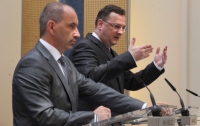Czech Republic looks to more nuclear
09 November 2012
The Czech Republic will work to cut its reliance on coal and increase nuclear to supply half of its energy needs under a new long-term energy policy unveiled by prime minister Petr Necas.
 |
| Trade and industry minister Martin Kuba and prime minister Peter Necas talk about the new policy (Image: Government of the Czech Republic) |
The Czech cabinet has approved the new national strategic energy policy which will now go forward for government approval. Developed by a high-level working group with input from the Ministry of Trade and Industry and the State Office for Nuclear Safety, the policy aims to achieve energy security with 80% of electricity produced domestically. "The strategic priority for the State Energy Policy is to achieve a balanced mix of energy sources," Necas said.
The country currently produces some 60% of its electricity from coal, with its six nuclear units supplying just over 30%. The new policy wants this to change, with a decline in coal's share of the energy mix to one-third of its current levels by 2040, while nuclear grows to supply at least 50%.
The increase in nuclear will be achieved through the completion of Temelin units 3 and 4, life extensions to all four existing units at Dukovany and the construction of a further unit at Dukovany. The construction of the new Temelin units has been envisaged in Czech policy since 2004 and a tender process is currently under way, with Czech utility CEZ expecting to select a reactor supplier and sign a construction contract by the end of 2013. Additional units at Dukovany have also long been envisaged as a possibility, and CEZ is already working to extend the lives of the existing Dukovany units to 60 years.
At the same meeting, the Czech government also approved a renewable energy policy that aims to promote the use of renewable sources. Trade and industry minister Martin Kuba told a press conference that any growth in renewables must be achieved "naturally" and without major public funding. Guaranteed Czech feed-in tariffs for solar are currently very high, and Kuba said the government would be aiming to reduce government support for the most expensive renewables from 2014, in order to protect the Czech economy from unsustainable price increases.
Researched and written
by World Nuclear News